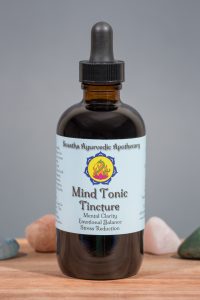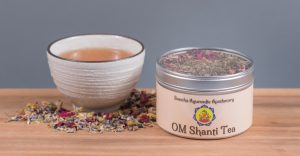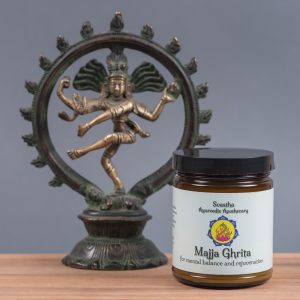 They say we are what we eat, but this statement goes beyond the context of our physical health and body. The food choices we make are intimately connected with the state of our mental-emotional health, and to create harmony in the mind, we must first find balance in our daily diet. Whether you are experiencing anxiety, anger, depression, mood disorders, or anything in between, eating foods that will calm the imbalance and avoiding foods that will cause further disruption can be a great start in your journey toward optimal health – mind, body, and consciousness.
They say we are what we eat, but this statement goes beyond the context of our physical health and body. The food choices we make are intimately connected with the state of our mental-emotional health, and to create harmony in the mind, we must first find balance in our daily diet. Whether you are experiencing anxiety, anger, depression, mood disorders, or anything in between, eating foods that will calm the imbalance and avoiding foods that will cause further disruption can be a great start in your journey toward optimal health – mind, body, and consciousness.
When it comes to eating for emotional balance, one of the easiest ways to decipher the best food choices is to break down the qualities of the imbalance along with the qualities of the food. According to Ayurveda, “like increases like” and “opposites bring balance”. To put this in a clearer context, we can take anxiety as an example. The qualities of anxiety include light, mobile, cold, and dry. Therefore, to establish balance, you should avoid foods with similar qualities (e.g. caffeine, cold cereal, raw salad, green juice, cold-raw smoothies) while favoring foods that contain the opposing qualities of heavy, grounding, warm, and moist (e.g. golden milk, soups, kitchari, stews, porridges, oatmeal).
Another way to discover a healthy, balancing diet will be to understand which dosha is causing the emotional imbalance and adhere to a diet that will calm that particular dosha. To continue with our example of anxiety, this is considered a Vata emotion; therefore, in order to calm the anxiety and balance the mind, a Vata-pacifying diet will likely be a good place to begin.
Of course, if you are experiencing multiple emotional imbalances simultaneously, or if you are of one body type, but your emotional imbalance stems from another, then the path toward a healthy diet may not be as clear. In these situations, you may need to follow a diet that will cover all of the related doshas. For instance, a Kapha type suffering from anxiety (Vata) may need to follow Kapha-Vata dietary guidelines. If you are suffering from both depression (Kapha) and anger issues (Pitta), a Kapha-Pitta pacifying diet may be in order. As you can see, some areas may be more complex. If you are still confused on where to begin after reading this article, it will be best to seek the guidance of a knowledgeable Ayurvedic practitioner who can give you more individualized recommendations.
Before beginning with some specific dietary guidelines to follow for each emotional imbalance, it will be good to address a few areas that are universally recommended. One of the most effective ways to create balance in the body and mind is to find balance in your daily routine, and this includes your meal schedule. Eating healthy meals at proper times will help to stabilize your blood sugar, appetite, mood, and energy levels, which will subsequently bring balance to your mind and emotions. Alternatively, skipping meals will lead to a reduced ability to control your emotions and will be the most detrimental with the emotions related to the “light” quality, such as fear, anxiety, worry, hyperactivity, and restless mind.
Similarly foods that cause major blood sugar fluctuations such as refined grains, refined sugar, and excessive sugar intake (even naturally sourced) can create mood swings, blood sugar spikes (leading to hyperactivity, anxiety, etc), blood sugar crashes (provoking depression, dull foggy mind, etc), and unhealthy food cravings (furthering the cycle). With these factors in mind, following a healthy diet filled with fiber, lean protein, whole grains, fresh fruits and vegetables, unprocessed foods, home-cooked meals, and a proper meal schedule will likely aid in just about any mind, emotion, or mood disorder.
WRITER’S NOTE: Although I truly believe that a healthy, proper diet can create mental-emotional balance and alleviate many psychological disorders, I am not a medical doctor. These recommendations are not intended to cure any disorder, nor replace any medical advice or prescribed medications. If your goal is to eliminate or reduce medications, please do so only with the guidance of your medical doctor.
Discover our products for Emotional Wellness!
Dietary Guidelines for Mental & Emotional Balance
Anxiety – Fear – Worry
Anxiety is extremely prevalent in today’s overworked, over-ambitious, and over-technological society. Although this is a Vata-type emotional imbalance, people of all body types are falling prey to this penetrating and all-encompassing disorder. If you find yourself overly anxious, fearful, or full of worry, it may be time to look at your diet to see if there are changes that can be made to ground your energy and calm your mind.
Anxiety, fear, and worry all relate to the mobile, light, dry, and cold qualities, and therefore eating a diet mainly of cold, raw, and light foods, under-eating, and skipping meals will all increase these qualities and thus provoke the anxiety. On the contrary, eating healthy but heavier food choices that are warm, well-cooked, oily, and soupy will help to calm the anxiety-fear-worry, nourish the nervous system, and create balance in your mind.
Another area to look at will be HOW you are eating. Since anxiety is related to the mobile quality, it will be essential to eat your meals sitting down, with a clear mind, and in a peaceful environment. Eating while on the go, while working, while on the computer or phone, or while in heavy conversation will undoubtedly stimulate anxiety, cause digestive issues, and lead to further imbalances.
Since anxiety, worry, and fear all stem from Vata dosha as well as Vishama Agni (irregular digestion accompanied by gas, bloating, and constipation), a Vata-reducing diet may be a beneficial place to begin. By regulating your diet and improving digestion, your mind will soon follow.
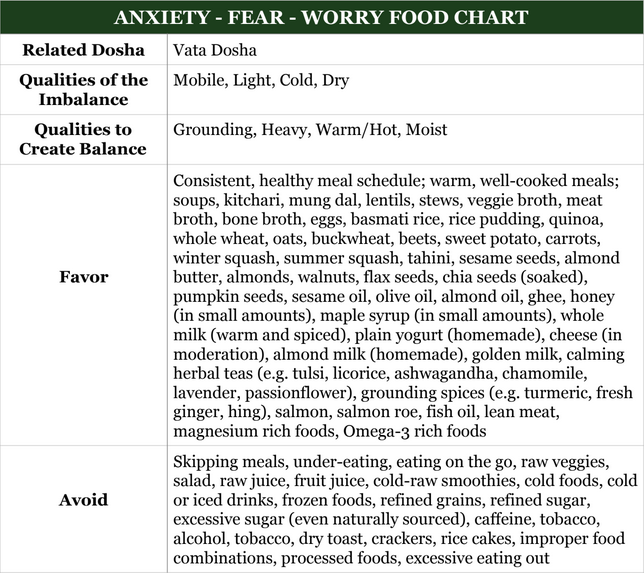
Hyperactivity – Restless Mind
Hyperactivity and a restless mind are very similar to anxiety and, in fact, can often be experienced simultaneously. Hyperactivity is related to Vata dosha, which is comprised of the air and space elements. Excessive air and space in the system will lead to racing thoughts, poor concentration, inability to focus, and overall restlessness.
The qualities of hyperactivity are mainly light, mobile, and clear, and any food or activity that increases these qualities in the system will directly increase the hyperactivity. Therefore, the diet should be Vata-reducing and favor foods that are heavy, dense, and grounding to calm the airy, spacey, restless kinetic energy that is prevalent with hyperactivity. Whole grains, lean protein, healthy fiber, steamed veggies, sweet potato, root veggies, soups, kitchari, casseroles, stews, oatmeal, porridges, healthy oils, and broths are all great options and can be included in the diet regularly. If you are an omnivore, meat broth, bone broth, and lean meat (in small amounts) can also be very nourishing and grounding dietary staples.
Just as important will be to avoid any foods that increase the light, mobile, and clear quality. One of the most important is refined sugar and any foods or drinks that contain such. It is no secret that white sugar causes major blood sugar spikes, which is sure to provoke hyperactivity in an instant. Similarly, ALL sugar (cane sugar, organic sugar, date sugar, honey, maple syrup, etc) should be greatly limited, as well as fruit juice, dried fruit, fruit smoothies, and high sugar fruits. Other provoking foods that should be strictly avoided or limited during times of hyperactivity or restlessness include refined grains (e.g. white bread, pasta, white flour), processed foods, and caffeine (including tea and chocolate).
Another simple way to ground the energy each day will be to eat meals (ideally home-cooked) at regular times, and eat all food while sitting down with full attention. Always avoid skipping meals and eating on the go. Never eat while working, on the phone, on the computer, or in the car. This inattention is very ungrounding and will lead to further restlessness and digestive distress.
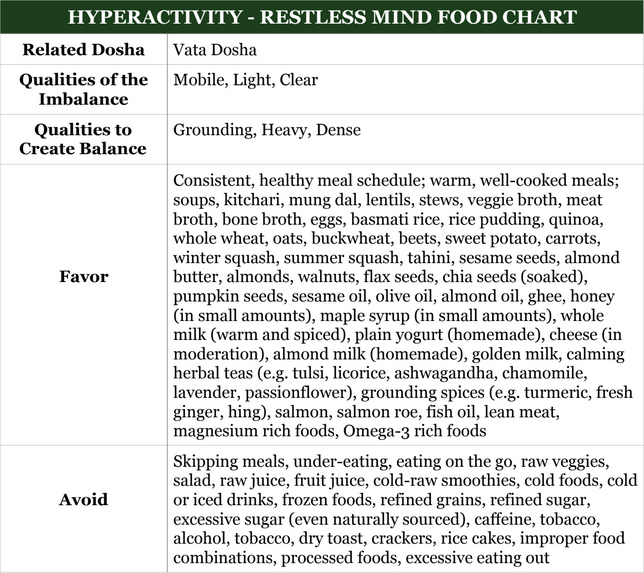
Depression
Depression often stems from excessive Kapha dosha in the mind, as well as a slow, sluggish digestive fire known as Manda Agni (sluggish digestion accompanied by dull appetite, slow metabolism, and sleepiness after food). The main qualities of depression include heavy, dense, and stable, and to find balance, we must strengthen the digestive fire and establish a proper diet that provides us with the opposing qualities of light, stimulating, and mobile. A general Kapha-reducing diet may be a good place to begin and will help to speed up your metabolism, reduce heaviness, and uplift your mind and mood.
When looking to balance out the heaviness that depression often brings, it will be essential to focus on lightening foods such as steamed veggies, salad, fresh vegetables, mung dal, red lentils, legumes, broth-based soups, spicy foods, bitter greens, and lighter whole grains such as quinoa, millet, and buckwheat. Favor a high fiber and lean protein diet, while limiting carbohydrates (especially “simple” carbs). Spices are a powerful way to stimulate digestion, increase circulation, and energize the mind, with Trikatu, Kapha Churna, dry ginger, turmeric, black pepper, cumin, cinnamon, and brown mustard seed being some of the best options. Omega-3 fatty acids and antioxidants are very nourishing for the brain and mind, while B vitamins (especially folate and B12) are very energizing and uplifting. Therefore, foods rich in these nutrients should be eaten daily.
While focusing on the foods and nutrients listed above, it will be equally essential to limit foods that are considered heavy, dense, and hard to digest. Some of the most important foods to avoid will be cow’s milk, cheese, butter, meat, oily fish, wheat, gluten, bread, pasta, soy, egg yolks, refined grains, white rice, white sugar, sweets, processed foods, unhealthy oils and fats, and fried food. By eliminating these foods, your digestion will improve and you will feel a new sense of lightness – body, mood, and mind!
It is not always what we are eating that affects our health; we must look at HOW we are eating as well. If you are experiencing depression, it will be very beneficial to eat your largest meal midday and your lightest meal in the evening. Always avoid eating after 6 pm and lying down after food intake. Snacking, grazing, and overeating will hamper digestion and create toxins, which will, in turn, provoke heaviness and a state of depression. Alternatively, taking a brisk walk after a meal will help boost your digestion, energy, and mood.
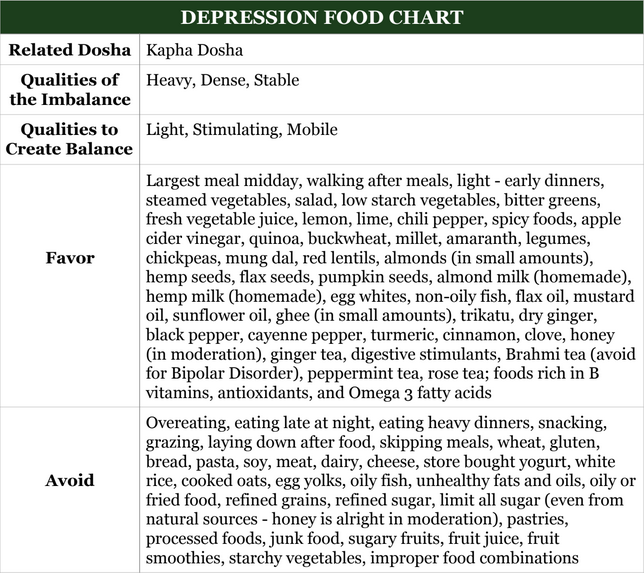
Dull, Foggy Mind
If you feel like you are walking around with a cloud in your head, your diet may be to blame. Similar to depression, a dull, foggy mind often stems from excessive Kapha dosha in the mind. The main qualities involved are dull and cloudy, although heavy, slow, and dense will be elevated as well. Therefore, in order to create clarity in the mind, we must avoid foods that possess these dulling qualities and favor foods that are clear, sharp, penetrating, light, and stimulating.
When experiencing a dull, foggy mind, the most important foods to avoid will be dairy, wheat, gluten, white sugar, refined grains, heavy meats, excessive meat, and processed foods. Eating a diet rich in simple, processed carbs such as bread, pasta, and white rice will create heaviness, sluggish digestion, and blood sugar crashes, all of which can be linked to a dull state of mind. Similarly, a diet high in dairy (milk, cheese, butter, yogurt) is sure to create a heavy, congestive, and cloudy mental state as well.
While strictly cutting out these dulling foods, you can move your dietary focus to healthier, lighter alternatives. Some of the best choices to include will be spicy foods, bitter greens, steamed vegetables, broth-based soups, quinoa kitchari, mung dal, red lentils, legumes, lighter whole grains (e.g. quinoa, millet), and chicken or veggie broth. A very simple way to make any food more stimulating is to add in some heating spices such as Trikatu, Kapha Churna, dry ginger, black pepper, turmeric, brown mustard seed, cinnamon, and cayenne pepper.
A dull, foggy mind often accompanies a slow, sluggish digestion. To enhance the digestive fire, a strong ginger tea infusion can be sipped on between meals, and a stimulating digestive aid should be taken before each meal (try our Kapha Honey Infusion!). If herbal support is needed, Brahmi tea, peppermint tea, or tulsi tea will all be beneficial.
Another culprit when experiencing dullness in the mind is a lack of healthy, lean protein and fiber-rich foods. These types of foods help to keep the appetite, energy, and blood sugar stable, and our minds clear and sharp. Alternatively, if your diet is filled with simple carbs and not enough protein, the energy and blood sugar will experience major crashes, which has a direct effect on the efficiency and alertness of the mind. Similarly, skipping meals will create low blood sugar levels, low energy levels, and a dull, cloudy, depleted mind.
Eating heavy meals late at night will cause low energy and a foggy mind the following morning. Excessive snacking and grazing will cause a sluggish, depleted digestive fire, which in turn can create dullness in the mind. Lying down or sleeping after food intake will also provoke the heavy quality, which can consequently lead to heaviness in the mind. Alternatively, you can perform Kapala Bhati Pranayama before meals to spark the fire and sharpen the mind, and take a brisk walk in the fresh air after meals to avoid sleepiness after food.
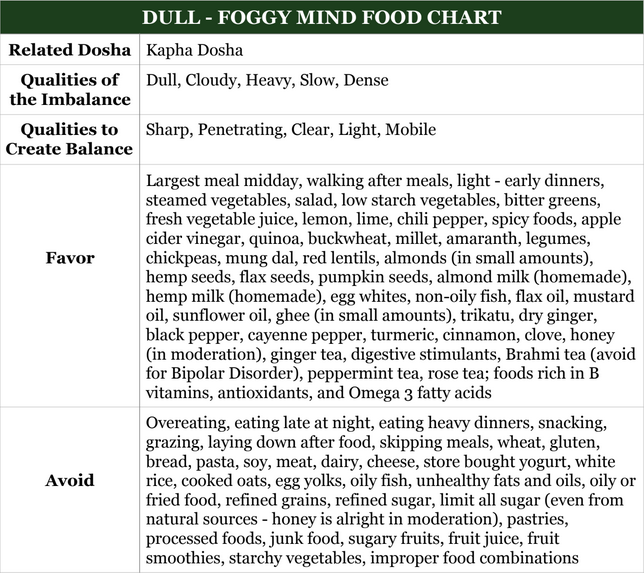
Bipolar Disorder
If you are experiencing Bipolar Disorder, establishing a healthy diet will be a great way to naturally reduce flare-ups and find balance in your day-to-day life. Since the nature of this disorder is fluctuation, a proper and consistent meal schedule filled with lean protein and high fiber will be extremely necessary to help stabilize your energy and blood sugar levels and thus stabilize your mood. Skipping meals, grazing, or eating a diet filled with refined grains, refined sugar, excessive sweets, simple carbs, processed foods, and junk food will all lead to instability in your blood sugar, energy, mood, and emotions.
Since the manic state of Bipolar Disorder is very similar to hyperactivity, one should focus on the dietary recommendations listed above for hyperactivity during those times. During times of depression, it will be important to stick to the dietary recommendations listed above for depression. During times of relative emotional balance, it will be just as important to follow a healthy diet that adheres to your Ayurvedic body type (take our Dosha Quiz here!), current imbalances, and the current season to prevent future flare-ups.
NOTE: Although the herb Brahmi is very beneficial for depression, it is not recommended with Bipolar Disorder as it can provoke mania. Any recommendations listed in this article that include Brahmi, should be strictly avoided if you are experiencing Bipolar Disorder.
Anger – Irritation – Short Temper
Anger, irritation, and a short temper all fall under Pitta dosha imbalances and relate to the qualities of hot, sharp, and penetrating. These heated emotional imbalances may also bring about tendencies of excessive judgment and criticism. If you are experiencing one or more of these emotional issues, it will be beneficial to follow a Pitta-reducing diet filled with cool, soothing foods.
To calm the fire that is interrelated with anger and irritation, you should favor the tastes of sweet, bitter, and astringent. For this, sweet-juicy fruits (e.g. ripe peach, ripe mango, red grapes, fresh figs, dates), bitter vegetables (e.g. kale, leafy greens, bitter melon), astringent fruits (e.g. apple, pomegranate, cranberries), and astringent vegetables (e.g. sprouts, asparagus, celery) will all be beneficial. Whole milk, almond milk (homemade), ghee, basmati rice, rice pudding, whole wheat, oats, coconut, and avocado are all very soothing and cooling for the mind and will help to alleviate and prevent anger issues when eaten regularly. Other cooling additions to the diet can be Pitta Churna, lime, cilantro, cilantro juice (get recipe here!), coconut oil, aloe vera juice, and maple syrup. For your protein needs, egg whites, mung dal, black eyed peas, black beans, chickpeas, quinoa, egg whites, white meat chicken (if applicable), and fresh water fish (if applicable) are all great options.
While focusing on these soothing food types, it will be essential to avoid sharp, penetrating, and heating foods that will undoubtedly cause your anger and irritation to rise. Some of the most important will be spicy foods, salty foods, oily foods, fried food, chili pepper, cayenne pepper, black pepper, vinegar, fermented foods, citrus fruits (except lime), pickles, sesame oil, inflammatory foods, red meat, pork, saltwater fish, processed foods, alcohol, tobacco, coffee, caffeine, and excessive eating out.
As with any emotional imbalance, eating on a healthy and consistent meal schedule filled with lean protein and fiber will be essential. Anger and irritation are often triggered by hunger (aka “hangry”) and low blood sugar levels; therefore, a small healthy snack may be needed between meals, such as a couple of dates, a small cup of rice pudding, or a piece of whole wheat toast with coconut oil or ghee. Take a few deep belly breaths before each meal to calm your energy and clear your mind. Never eat while working, arguing, or in heavy conversation, as these will all create further imbalance.
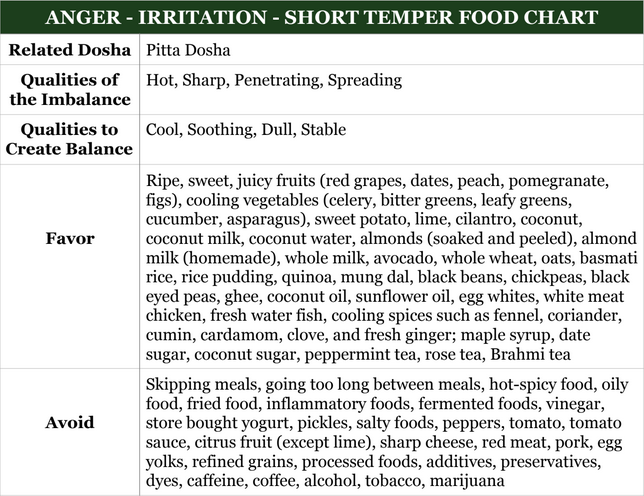
Conclusion
Our diet not only fuels and nourishes our physical bodies, but also our minds. Eating a wholesome diet that is suitable for our personal needs is an effective way to balance our mind and mood. Favoring foods that calm our unwanted emotional tendencies and limiting foods that provoke them is an essential way to support mental health naturally. By following the appropriate recommendations above, observing a healthy, consistent meal schedule, favoring lean protein and fiber, and limiting simple carbs and processed foods, we can balance our blood sugar, appetite, and energy—and thus take control of our mind, mood, and attitude!


